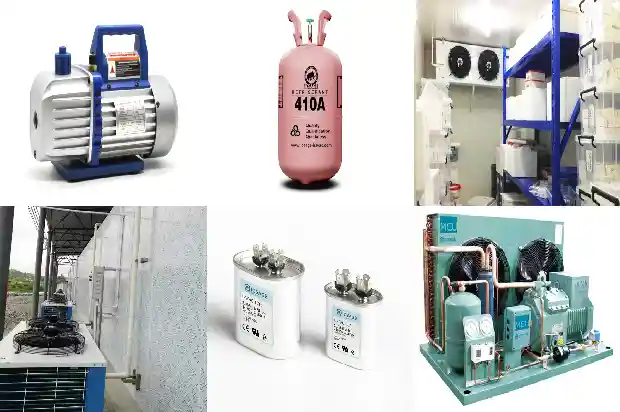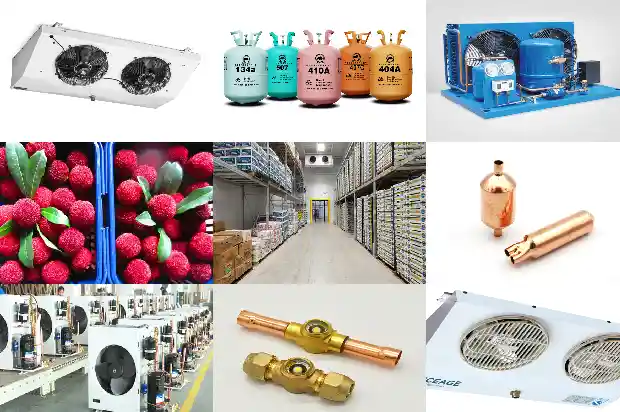How to Improve the Energy Efficiency of Air - conditioner Compressors?
2025-03-16
The main energy - consuming components of an air conditioner include: compressor, indoor fan, outdoor fan, control system, air - direction motor, standby power consumption, etc. Among them, the energy consumption of the air - conditioner compressor is relatively high. Therefore, how to improve the energy efficiency of the air - conditioner compressor has always been a matter of great concern.
7 General Ways to Improve the Energy Efficiency of Air - conditioner Compressors
First of all, it must be noted that the improvement of the compressor's energy efficiency mainly relies on technological improvements rather than a significant increase in material consumption. This is also the most cost - effective energy - saving method in terms of technical economy.
Secondly, what I want to say is that the following 7 general ways to improve the energy efficiency of air conditioners are just general methods.
First of all, it must be noted that the improvement of the compressor's energy efficiency mainly relies on technological improvements rather than a significant increase in material consumption. This is also the most cost - effective energy - saving method in terms of technical economy.
Secondly, what I want to say is that the following 7 general ways to improve the energy efficiency of air conditioners are just general methods.
- Improve the motor efficiency. An increase in the motor efficiency means an increase in the electrical efficiency of the compressor and the overall efficiency of the compressor.
- Reduce frictional power consumption. Reducing frictional power consumption means an increase in mechanical efficiency.
- Improve the gas valve. Any improvement in aspects such as the correctness of the gas - valve movement law, the reasonable matching of spring force and air - flow thrust, the optimization of structural parameters, the reduction of flow resistance, and the control of the clearance volume caused by the gas valve can improve the efficiency of the compressor.
- Reduce the suction and exhaust pressure losses and pressure pulsations.

- Increase the temperature coefficient.
- Increase the volumetric coefficient.
- Reduce leakage, that is, increase the leakage coefficient.
Explanation 1: The Energy Efficiency of an Air - conditioner Compressor ≠ Actual Energy Efficiency
However, it should be noted that for the convenience of measurement and comparison, the energy efficiency of the compressor is measured under a specific operating condition. Compressor manufacturers develop and design high - efficiency compressors for this specific condition in order to obtain a high energy - efficiency evaluation.
But when the air conditioner is undergoing performance testing, the operating condition of the compressor is often not its design condition, and this operating condition also varies depending on different air - conditioner designs.
In this way, compared with the energy efficiency of the compressor under the design condition, there are two levels of variables in the actual operation of the compressor: the specific design of the air conditioner (depending on the air - conditioner manufacturer) and the usage environment. Then, simply pursuing high efficiency of the compressor under the design condition loses the significance of energy conservation.
Therefore, the concept of the variable - condition performance of the compressor is proposed: The energy efficiency of the compressor should remain high within a relatively wide range, so that good energy - saving effects can be achieved during the actual operation of the air conditioner.
However, it should be noted that for the convenience of measurement and comparison, the energy efficiency of the compressor is measured under a specific operating condition. Compressor manufacturers develop and design high - efficiency compressors for this specific condition in order to obtain a high energy - efficiency evaluation.
But when the air conditioner is undergoing performance testing, the operating condition of the compressor is often not its design condition, and this operating condition also varies depending on different air - conditioner designs.

In this way, compared with the energy efficiency of the compressor under the design condition, there are two levels of variables in the actual operation of the compressor: the specific design of the air conditioner (depending on the air - conditioner manufacturer) and the usage environment. Then, simply pursuing high efficiency of the compressor under the design condition loses the significance of energy conservation.
Therefore, the concept of the variable - condition performance of the compressor is proposed: The energy efficiency of the compressor should remain high within a relatively wide range, so that good energy - saving effects can be achieved during the actual operation of the air conditioner.
Explanation 2: The Energy Efficiency of the Compressor ≠ the Energy Efficiency of the Air Conditioner
From the perspective of air - conditioner design, a high - efficiency compressor can improve the efficiency of the air conditioner. But conversely, the improvement of the air - conditioner's energy efficiency does not entirely depend on the compressor. In other words, a relatively high - efficiency air conditioner can be developed with a less - efficient compressor, and a low - efficiency air conditioner can also be manufactured with a high - efficiency compressor. Everything depends on the actual operating condition of the compressor when the air conditioner is tested under the testing condition specified by the national standard.
At present, some air - conditioner manufacturers use high - efficiency compressors and smaller heat exchangers to manufacture low - energy - efficiency air conditioners to reduce costs. At this time, due to the large heat - exchange temperature difference, the exhaust pressure of the compressor is relatively high, the suction pressure is relatively low, resulting in a large pressure ratio of the compressor, low refrigeration capacity, and low efficiency. Developing a high - efficiency air conditioner requires a larger heat exchanger.
Therefore, from the perspective of air - conditioner design, improving the efficiency of the air conditioner includes two aspects:
(1) When designing an air conditioner under the fixed testing condition specified by the national standard, make the air conditioner have a high efficiency, which includes the meaning of giving full play to the refrigeration capacity and high efficiency of the compressor.
(2) The concept of variable - condition operation of the air conditioner: The air conditioner should maintain a high energy efficiency within a relatively wide range, so that good energy - saving effects can be achieved during the actual operation of the air conditioner.
From the perspective of air - conditioner design, a high - efficiency compressor can improve the efficiency of the air conditioner. But conversely, the improvement of the air - conditioner's energy efficiency does not entirely depend on the compressor. In other words, a relatively high - efficiency air conditioner can be developed with a less - efficient compressor, and a low - efficiency air conditioner can also be manufactured with a high - efficiency compressor. Everything depends on the actual operating condition of the compressor when the air conditioner is tested under the testing condition specified by the national standard.
At present, some air - conditioner manufacturers use high - efficiency compressors and smaller heat exchangers to manufacture low - energy - efficiency air conditioners to reduce costs. At this time, due to the large heat - exchange temperature difference, the exhaust pressure of the compressor is relatively high, the suction pressure is relatively low, resulting in a large pressure ratio of the compressor, low refrigeration capacity, and low efficiency. Developing a high - efficiency air conditioner requires a larger heat exchanger.
Therefore, from the perspective of air - conditioner design, improving the efficiency of the air conditioner includes two aspects:
(1) When designing an air conditioner under the fixed testing condition specified by the national standard, make the air conditioner have a high efficiency, which includes the meaning of giving full play to the refrigeration capacity and high efficiency of the compressor.
(2) The concept of variable - condition operation of the air conditioner: The air conditioner should maintain a high energy efficiency within a relatively wide range, so that good energy - saving effects can be achieved during the actual operation of the air conditioner.
Related Articles
- Energy - saving Control and Adjustment of Main Operating Parameters of the Refrigeration System
- How to Make Refrigeration Systems More Energy - Efficient?
- How to Reduce the Energy Consumption of Central Air - Conditioning System through System Integration?
- What's the principle and function of air energy?
- Maintenance Methods for Exhaust Volume and Winding Performance of Typical Air - conditioner Compressors
- Air Conditioners Also Have a "Shelf Life". If on a Tight Budget, Don't Rush to Replace. Try This and It Could Last a Few More Years
- Manifestations of Insufficient Air - conditioner Refrigerant and Judgment of the Charging Amount
- Do You Know All the 34 Components of the Air-cooled Multi-connected Unit?
- The "Horsepower" Rating, Power and Refrigeration Capacity of Air Conditioners
- Training on Precision Air Conditioners: Here's the Valuable Article You Need~~
- The horsepower of an air conditioner originally refers to the input power, including that of the compressor
- The Indoor Humidity Is Too High in Summer. How to Dehumidify? Can the Dehumidification Mode of the Air Conditioner Really Save Electricity and Money?
- Frosting in the Cold Storage? A Detailed Explanation of the 9 Reasons for Frosting of Air Coolers and 4 Defrosting Methods~~
- Why Does the Air Cooler Frost? What Are the Defrosting Methods?
- Noise Reduction and Vibration Damping in Refrigeration and Air Conditioning Systems
- Air-cooled, Water-cooled, Chilled Water, Dual Cooling Source and Free Cooling Precision Air Conditioners
- Installation and Welding of Precision Air Conditioning Systems
- Performance Comparison of Air-Cooled Heat Pumps, Multi-Split Systems and Water-Cooled Units
